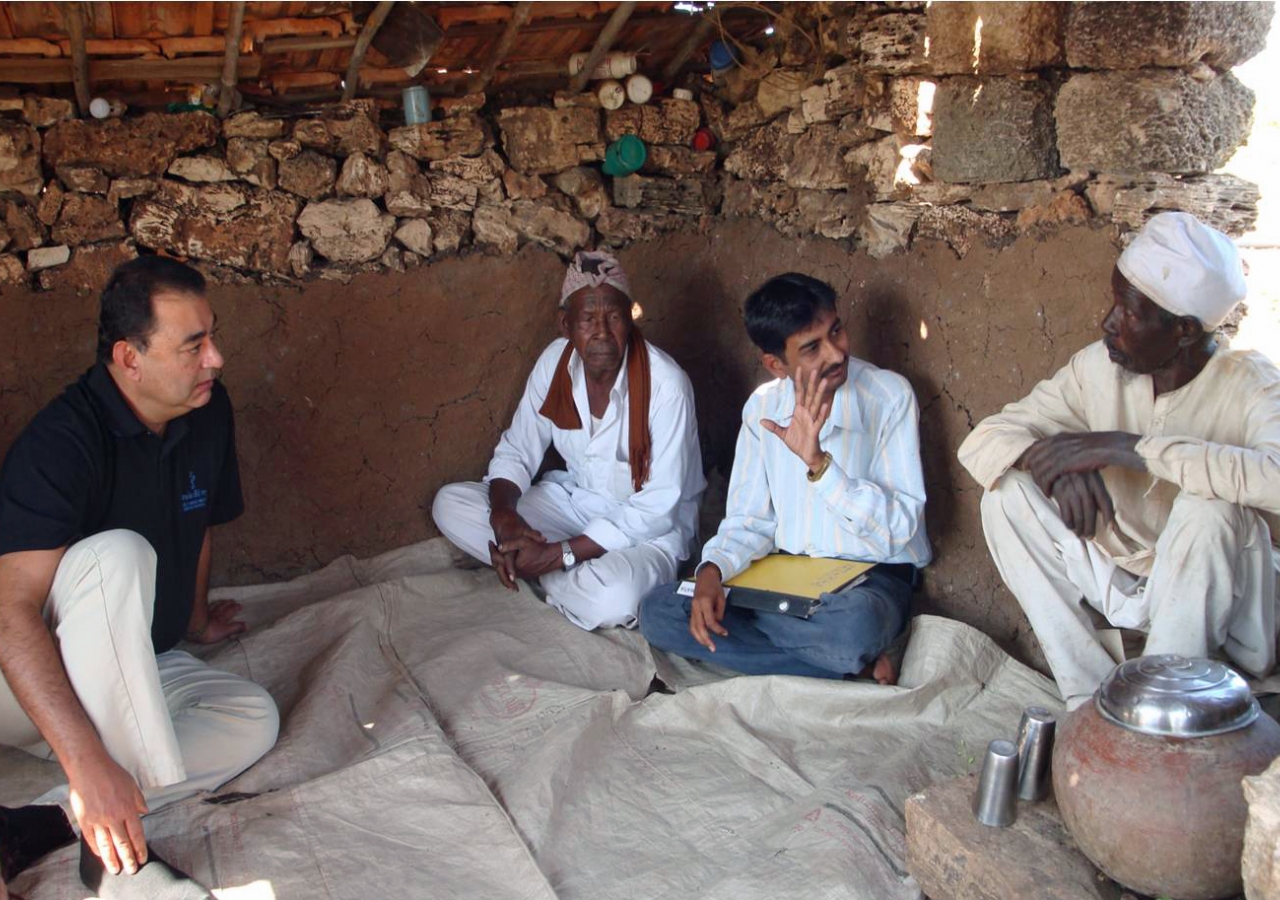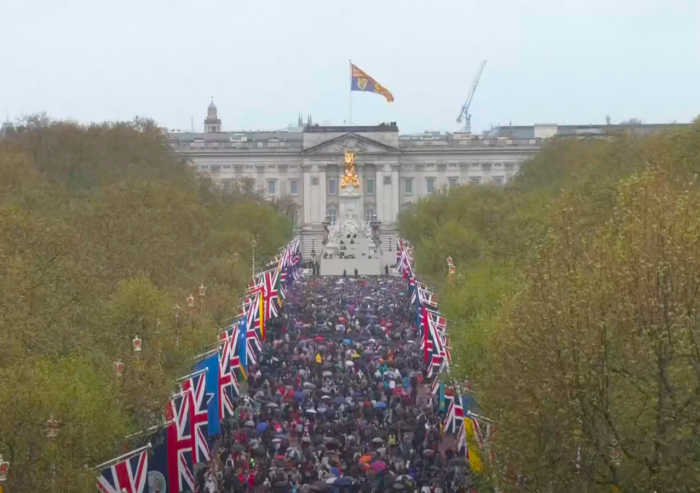 Prashant Joshi, Karim Jetha, Munir Samji, and Rahim Velji together with staff from AKF India. Courtesy of Prashant Joshi
Prashant Joshi, Karim Jetha, Munir Samji, and Rahim Velji together with staff from AKF India. Courtesy of Prashant JoshiMunir Samji, Prashant Joshi, Rahim Velji and Karim Jetha spent seven days in India, where they visited the Environmental Health Improvement Programme in Gujarat. The programme – a collaboration between the Aga Khan Foundation (India) and the Aga Khan Planning and Building Services, India – was one of the three selected to receive funds raised at the Partnership Walk & Run, which took place in July 2009 (the other two were the Early Childhood Education Programme in the Kyrgyz Republic and the Rice Yield Improvement Programme in Madagascar). The group also had a chance to see the Aga Khan Rural Support Programme's (AKRSP's) work with the Siddhis, a marginalised tribal community whose ancestors were brought to India from Africa some 500 years ago.
Each of the four brought their own unique perspective to India, informed by different backgrounds and experiences. Samji, a businessman, represented the largest individual fundraiser; Joshi, a member of the Financial Services department at Ernst & Young, represented the team which had the highest number of members; Velji, a student, represented the North London Dental Group, the team which raised the most funds; and Jetha, who helped organise the Partnership Walk & Run, accompanied the prize winners at his own expense.
The four recently shared their impressions from the trip with TheIsmaili.org.
What were you looking to get out of the trip?
Samji: I was hoping to gain more awareness of what actually takes place on the ground. You hear about all these programmes in health and rural support, but I thought it would be useful to actually witness it, to see it being carried out firsthand.
Velji: There is no better way to understand the impact of a development agency than to meet the people whom it affects. One can have all the facts and figures in the world, but this pales in comparison to the firsthand experience of meeting the beneficiaries.
Jetha: I was interested to learn from the AKDN staff how the funds raised from the summer's Walk & Run would be deployed. On a more general level, I was keen to understand how specific projects embodied the principles of AKDN, particularly that of “sustainable” development.
What did you learn about the Environmental Health Improvement Programme?
 The sur-panch of Amrapur shows off an award for sanitation bestowed upon the village by the government. Photo: Prashant Joshi
The sur-panch of Amrapur shows off an award for sanitation bestowed upon the village by the government. Photo: Prashant JoshiSamji: We can all imagine the inconvenience of not having water on tap, or not being able to make use of latrine facilities. But seeing firsthand the effect that the introduction of water and sanitation facilities has had on people's lives is quite amazing.
Where a woman might have had to make three round trips, taking two hours each time, to fetch water, this is now available in the family home. These ladies now have an extra six hours each day to tend to their children, their homes and to assist in the family enterprise (usually small scale farming).
Thanks to the efforts of the Aga Khan Planning & Building Services, the three villages we visited all had reached close to 100 per cent household penetration of water and sanitation facilities. What was also particularly encouraging was that these facilities were developed and introduced in conjunction with the elected leadership in each village, and each household had to make a significant contribution towards the construction costs.
Velji: I had not appreciated that the lack of access to sanitation facilities affects women more than men, due to the need for privacy and dignity. We heard stories of women altering their diets to make defecation less frequent, and how they used to travel great distances at night to find privacy. This was detrimental to their sleep patterns and exposed them to risks: for example disease or wandering alone on roads at night. By working with village committees, setting up women's groups, educating the local population and ultimately building sanitation facilities, the Aga Khan Planning & Building Services was able to make a noticeable improvement to their quality of life.
You also saw the Aga Khan Rural Support Programme's work with the Siddhi community – tell us a bit about that.
Samji: We met two peasant farmers and were able to talk with them about the improved yields from their small holdings, which was the result of advice and support from the AKRSP. In many cases, the income of the farmers from the land has doubled to 15,000 rupees (GBP £200) per annum, particularly through better irrigation facilities. Of course, this is still a very small amount to be earning, but is supplemented through working as labourers.
The highlight of the trip was meeting members of the Siddhi Women's Group. We listened with great interest as to how these ladies were trying to improve their lot, and their aspirations for the future. It started with their grouping together and putting aside small amounts of regular savings, then forming a management committee, which would consider applications for small loans to help start micro businesses, such as dairy, compost or catering.
Velji: The motivation and drive possessed by this community was truly inspirational. They are a case study in how, given the means, even the most marginalised in society can make progress. They were given the inspiration and a helping hand by AKRSP to form a women's group, and there are now a total of 52 to date. This community has won numerous national awards, and they have started to set up their own business ventures as a collective community. For a marginalised group with little to no formal education, it is truly impressive to see the vision they have, as well as the drive to realise that vision.
Their goals are not short term either. For example, they told us of their plan to pool together the milk they collect from their buffalos so they do not all need to travel to a nearby village to sell. Once critical mass has been obtained, the dairy collects milk from their village and at a better price.
What were your impressions of the people that you met in Gujarat?
Joshi: I was touched to see that the beneficiaries of the project were very much appreciative as evidenced by their humility, respect and positive outlook on life. The children in the villages had natural and deep-rooted smiles on their faces. The elders in the villages were very sober, wise and responsible adults.
Velji: They were incredibly gracious and we received more than our fair share of tea and ground nuts. Admittedly there was a language barrier as my Gujarati is not particularly eloquent (or existent!). However, they seemed like they were all really happy and plenty of laughs and smiles were shared.
Jetha: In the village of Nani Khodiyar, people of over ten different faiths lived side-by-side in a community of less than two thousand people. When we asked if there were any issues arising from people of different faiths living in such close proximity, the sur-panch (village leader) told us: “If God wanted us to live separately, he would have made us in different bodies.”
What was the most interesting thing you learnt about AKDN?
 Rahim Velji, Prashant Joshi and Munir Samji with a staff member from AKF India. Photo: Courtesy of Prashant Joshi
Rahim Velji, Prashant Joshi and Munir Samji with a staff member from AKF India. Photo: Courtesy of Prashant JoshiJoshi: I was very encouraged to see such a diverse mix of people among the staff, who were primarily locals and experts in social development. It was clear that the Foundation's focus was to use the most effective means to facilitate improvements in standards of living for those who most needed it, irrespective of caste, religion, or creed. The staff would really embed themselves in the communities of their projects. The local villagers would speak very highly of the AKDN staff, yet also treat them as they would their family members.
Velji: AKDN's commitment to sustainable development is really impressive. With beneficiaries contributing 70 per cent of the costs for building sanitation units (either in cash or in-kind), they took pride in their facilities and were taught how to maintain and repair them. This pride was evident in the villages we visited, with the villagers in Amrapur showing us an award for sanitation bestowed upon them by the government.
Jetha: Our visit centred on AKDN's efforts in one district (Junagadh), in one state (Gujarat), in one country (India). This highlighted the breadth and scale of AKDN's activities; it operates in 25 countries. Much is made of AKDN being a collection of development agencies and we saw firsthand evidence of these agencies working in collaboration with one another in close proximity.
What will you take away from this experience?
 Munir Samji speaks with to two Siddhi farmers. With advice and assistance from AKRSP, many of the farmers have improved in their income from the land – in some cases doubling it. Photo: Prashant Joshi
Munir Samji speaks with to two Siddhi farmers. With advice and assistance from AKRSP, many of the farmers have improved in their income from the land – in some cases doubling it. Photo: Prashant JoshiJoshi: I am very glad I went on the trip since I met some truly wonderful people both from the Ismaili community and the communities which AKDN was assisting. On a personal level, the trip reminded me of the need to be thankful for all that I have kindly been given in life.
Velji: The trip was extremely valuable and especially poignant for me as my family is from the area of Gujarat we visited. This connection made it easy for me to identify with the villagers. It is only because of the migration of my forefathers that I find myself in a much more privileged situation. I feel it is up to us, who are more fortunate, to support organisations like AKDN, which reach out to those in difficult situations and attempt to improve their quality of life.











